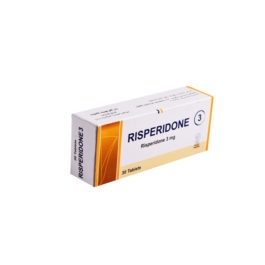Description
Lanzapine Tablets Increase chance of death in elderly patient with dementia-related psychosis.
1. WHAT LANZAPINE IS AND WHAT IT IS USED FOR
LANZAPINE belongs to a group of medicines called antipsychotics.
LANZAPINE is used to treat a disease with symptoms such as hearing, seeing or sensing things which are not there, mistaken beliefs, unusual suspiciousness, and becoming withdrawn. People with this disease may also feel depressed, anxious or tense.
LANZAPINE is used to treat a condition with symptoms such as feeling “high”, having excessive amounts of energy, needing much less sleep than usual, talking very quickly with racing ideas and sometimes severe irritability. It is also a mood stabiliser that prevents further occurrences of the disabling high and low (depressed) extremes of mood associated with this condition.
2. BEFORE YOU TAKE LANZAPINE
Do not take LANZAPINE
• if you are allergic (hypersensitive) to olanzapine or any of the other ingredients of LANZAPINE. An allergic reaction may be recognised as a rash, itching, a swollen face, swollen lips or shortness of breath. If this has happened to you, tell your doctor.
• if you have been previously diagnosed with eye problems such as certain kinds of glaucoma (increased pressure in the eye).
Take special care with LANZAPINE
• Medicines of this type may cause unusual movements mainly of the face or tongue. If this happens after you have been given LANZAPINE tell your doctor.
• Very rarely, medicines of this type cause a combination of fever, faster breathing, sweating, muscle stiffness and drowsiness or sleepiness. If this happens, contact your doctor at once.
• The use of LANZAPINE in elderly patients with dementia is not recommended as it may have serious side effects.
If you suffer from any of the following illnesses tell your doctor as soon as possible:
• Diabetes
• Heart disease
• Liver or kidney disease
• Parkinson’s disease
• Epilepsy
• Prostate problems
• A blocked intestine (Paralytic ileus)
• Blood disorders
• Stroke or “mini” stroke (temporary symptoms of stroke)
If you suffer from dementia, you or your carer/relative should tell your doctor if you have ever had a stroke or “mini” stroke.
As a routine precaution, if you are over 65 years your blood pressure may be monitored by your doctor.
LANZAPINE is not for patients who are under 18 years.
Taking other medicines
Only take other medicines while you are on LANZAPINE if your doctor tells you that you can. You might feel drowsy if LANZAPINE is taken in combination with antidepressants or medicines taken for anxiety or to help you sleep (tranquillisers).
You should tell your doctor if you are taking fluvoxamine (an antidepressant or ciprofloxacin (an antibiotic), as it may be necessary to change your LANZAPINE dose.
Please tell your doctor if you are taking or have recently taken any other medicines, including medicines obtained without a prescription. Especially tell your doctor if you are taking medicines for Parkinson’s disease.
Taking LANZAPINE with food and drink
Do not drink any alcohol if you have been given LANZAPINE as LANZAPINE and alcohol together may make you feel drowsy.
Pregnancy and breast-feeding
Neonates exposed to anti-psychotic drugs during the third trimester of pregnancy are at risk for extrapryamidal and /or withdrawal symptoms following delivery. There have been reports of agitations, hypertonia, hypotonia, tremor, somnolenece, respiratory distress and feeding disorders in these neonates. These complications have varied in severity; while in some cases symptoms have been self-limited; in other cases neonates have required intensive care unit support and prolonge hospitalization.
These products should be used during pregnancy only if the potential benefit justifies the potential risk to the fetus.
Driving and using machines
There is a risk of feeling drowsy when you are given LANZAPINE. If this happens do not drive or operate any tools or machines. Tell your doctor.
3. HOW TO TAKE LANZAPINE
Always take LANZAPINE exactly as your doctor has told you. You should check with your doctor or pharmacist if you are not sure.
Your doctor will tell you how many LANZAPINE tablets to take and how long you should continue to take them. The daily dose of LANZAPINE is between 5 and 20 mg. Consult your doctor if your symptoms return but do not stop taking LANZAPINE unless your doctor tells you to.
You should take your LANZAPINE tablets once a day following the advice of your doctor. Try to take your tablets at the same time each day. It does not matter whether you take them with or without food. LANZAPINE coated tablets are for oral use. You should swallow the LANZAPINE tablets whole with water.
If you take more LANZAPINE then you should
Patients who have taken more LANZAPINE then they should, have experienced the following symptoms: rapid beating of the heart, agitation/aggressiveness, problems with speech, unusual movements (especially of the face or tongue) and reduced level of consciousness. Other symptoms may be: acute confusion, seizures (epilepsy), coma, a combination of fever, faster breathing, sweating, muscle stiffness and drowsiness or sleepiness, slowing of the breathing rate, aspiration, high blood pressure or low blood pressure, abnormal rhythms of the heart. Contact your doctor or hospital straight away. Show the doctor your pack of tablets.
If you forget to take LANZAPINE
Take your tablets as soon as you remember. Do not take two doses in one day. If you stop taking LANZAPINE
Do not stop taking your tablets just because you feel better. It is important that you carry on taking LANZAPINE for as long as your doctor tells you.
If you suddenly stop taking LANZAPINE, symptoms such as sweating, unable to sleep, tremor, anxiety or nausea and vomiting might occur. Your doctor may suggest you to reduce the dose gradually before sleeping treatment.
If you have any further questions on the use of this product, ask your doctor or pharmacist.
4. POSSIBLE SIDE EFFECTS
Like all medicines, LANZAPINE can cause side effects, although not everybody gets them. Very common side effects: affect 1 user in 10
• Weight gain.
• Sleepiness.
• Increases in the levels of prolactin in the blood.
Common side effects: affect 1 to 10 users in 100
• Changes in the levels of some blood cells and circulating fats.
• Increases in the level of sugars in the blood and urine which sometimes may progress to coma specially in patients under 18 years.
• Feeling more hungry.
• Dizziness.
• Restlessness.
• Tremor.
• Muscle stiffness or spasm (including eye movements).
• Problems with speech.
• Unusual movement (especially of the face or tongue).
• Constipation.
• Dry mouth.
• Rash.
• Loss of strength.
• Extreme tiredness.
• Water retention leading to swelling of the hands, ankles or feet.
• In the early stages of treatment, some people may feel dizzy or faint (with a slow heart rate), especially when getting up from a lying or sitting position. This will usually pass on its own but if it does not, tell your doctor.
• Sexual dysfunctions such as decreased libido in males and females or erectile dysfunction in males.
Uncommon side effects: affect 1 to 10 users in 1,000
• Slow heart rate.
• Make you sensitive to sunlight.
• Urinary incontinence.
• Hair loss.
• Absence or decrease in menstrual periods.
• Changes in breasts in males and females such as an abnormal production of breast milk or abnormal growth.
Other possible side effects: frequency cannot be estimated from the available data.
• Allergic reaction (e.g. swelling in the mouth and throat, itching, rash).
• Diabetes or the worsening of diabetes, occasionally associated with ketoacidosis (ketones in the
blood and urine) or coma.
• Lowering of normal body temperature.
• Seizures, usually associated with a history of seizures (epilepsy).
• Combination of fever, faster breathing, sweating, muscle stiffness and drowsiness or sleepiness.
• Spasms of the muscle of the eye causing rolling movement of the eye.
• Abnormal rhythms of the heart.
• Sudden unexplained death.
• Blood clots such as deep venous thrombosis of the leg or blood clot on the lung.
• Inflammation of the pancreas causing severe stomach pain, fever and sickness.
• Liver disease appearing as yellowing of the skin and white parts of the eyes.
• Muscle disease presenting as unexplained aches and pains.
• Difficulty in passing urine.
• Prolonged and/or painful erection.
While taking olanzapine, elderly patients with dementia may suffer from stroke, pneumonia, urinary incontinence, falls, extreme tiredness, visual hallucinations, a rise in body temperature, redness of the skin and have trouble walking. Some fatal cases have been reported in this particular group of patients. In patients with Parkinson’s disease LANZAPINE may worsen the symptoms.
Rarely women taking medicines of this type for a long time have started to secrete milk and have missed periods or had irregular periods. If this persists tell your doctor. Very rarely babies born to mothers who have taken LANZAPINE in the last stage of pregnancy (3rd trimester) may have tremors, be sleepy or drowsy.
If any of the side effects gets serious, or if you notice any side effects not listed in this leaflet, please tell your doctor.
5. HOW TO STORE LANZAPINE
Keep at a temperature not exceeding 30C, in dry place.
Keep out of the reach and sight of children.
Do not use LANZAPINE after the expiry date, which is stated on the carton.
LANZAPINE should be stored in its original pack in order to protect from light and moisture.
Please return left over medicine to your pharmacist. Medicines should not be disposed of via wastewater or household waste. Ask your pharmacist how to dispose of medicines no longer required. These measures will help to protect the environment.
PACKING
A carton box containing 7 tablets in PVC/Al strip with a pamphlet.







Reviews
There are no reviews yet.